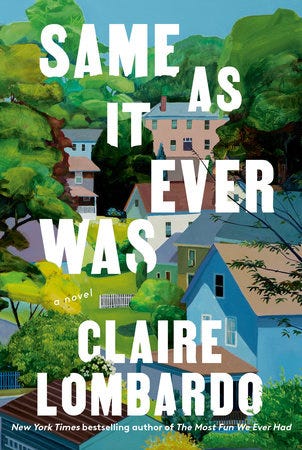Three Great Books #37
A beach read, a tragedy, and an instant classic.
Same As it Ever Was, by Claire Lombardo
This book was made for summer reading: big (~500 pages), sweeping in scope, compelling, and packed full of plot and feelings. In that way, it’s not terribly different from Lombardo’s previous novel, “The Most Fun We Ever Had,” which I described as an “addictive doorstop of a book.” But this focuses more intently on one character, Julia Ames, who is 57 and shopping at the supermarket for crab cake ingredients when the book begins. Julia runs into an older woman named Helen Russo whom she hasn’t seen in 17 years. They met when Julia was a young mother and having a tough time of it; back then, Helen swept her off her feet, platonically, and welcomed her into her expansive, seemingly idyllic life, until for reasons we learn later, their friendship abruptly ended. I love how Lombardo switches back and forth between Julia’s difficult past and the messy but wonderful life she’s built with her husband, teenage daughter, and grown son, revealing the pivotal points of her story at just the right time.
The Best Minds, by Jonathan Rosen
This is the true story of a friendship between the author, Jonathan Rosen, and his childhood schoolmate, Michael Laudor. They grew up together in 1970s New Rochelle, a New York City suburb, and for a while, they seemed to be headed down the same path — they aspired to be writers, and both went to Yale — even as Rosen felt his friend was always one step ahead, intellectually. But their fates diverged, as Michael’s erratic and impulsive behavior, often masked or excused by his brilliance, worsened and he was diagnosed with paranoid schizophrenia. After suffering a psychotic break, he recovered enough to attend Yale Law School and to become an advocate for accommodations for people with mental illness, attracting press coverage, a book contract and a Hollywood film deal. On the surface, it looked like Michael was working around his illness, if not overcoming it, but his life was continually haunted by delusions, including those that made him want to avoid his medication and turned his loved ones into threats. And because of how our mental health system is structured and (under)funded, there were few legal options for involuntarily committing him before he killed his girlfriend, Carrie Costello, in 1998. Rosen thoughtfully tells a heartbreaking story, and in doing so indicts the incentives baked into how we care (or don’t) for people whose illnesses, when untreated, strip away their ability to exist peacefully in the world. (Thanks to Lindsey for the recommendation.)
James, by Percival Everett
Everett’s latest novel has already secured its spot on many best-of-the-year lists, including mine. “James” retells the events of “Huckleberry Finn” from the perspective of Jim, the enslaved man who learns that he will be sold and separated from his wife and children and runs away to avoid that fate. James spends some of that time in flight with Huck, who himself has fled after faking his own death — they float on the river when they can, hide on land and forage for food, and run into characters both comic and deadly. But Everett’s James is erudite, deeply intelligent, and canny, hiding his ability to read, write, speak, and even think when he’s around white people; he knows the threat he would pose, and the consequences he would face, if he were not so grossly underestimated. (The danger posed to a Black man by even the petty theft of a pencil is grimly illustrated.) It would help to have read “Huckleberry Finn,” or to read it in tandem with “James,” just to understand what’s been reinterpreted, what’s been omitted, and what’s new, but it’s absolutely not necessary. (The timing of the book has been changed, for example, so that it takes place on the eve of the Civil War.) The ending is deeply moving, triumphant, and inevitable all at once.




Love this! I’m looking for a big book to fill a summer bingo square and am thrilled with the Claire Lombardo suggestion— thank you!
Great reviews thank you!